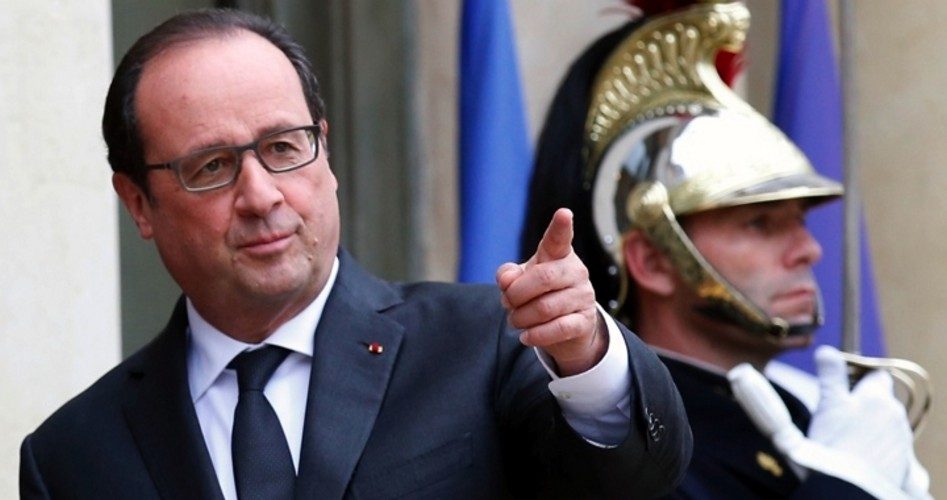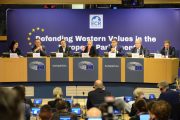
French President François Hollande (shown), speaking to a gathering of France’s mayors on November 18, said his nation would continue to welcome refugees despite the security concerns voiced by many of his countrymen following the Paris terrorist attacks of the 13th.
“Life should resume fully,” Hollande told the mayors, “France should remain as it is. Our duty is to carry on our lives.”
He added that “30,000 refugees will be welcomed over the next two years. Our country has the duty to respect this commitment.”
At an emergency EU summit held in Brussels on September 22, heads of government from the European Union approved a plan to distribute 120,000 migrants fleeing turmoil in the Middle East across Europe. Many of these migrants originated in Syria, fleeing the civil war between the government of Bashar al-Assad and the rebel forces attempting to remove Assad from power, and tens of thousands of them entered Europe via Hungary, enroute to their hoped-for final destinations, primarily Germany. Many also sought to enter France.
“Some wish to link the terrorist threat to the influx of migrants,” Hollande said during his address to the mayors. “Truth is, that link exists: The people are running from Iraq and Syria because they are attacked by the very same people who are attacking us today.”
As we noted in a November 17 article, Abdelhamid Abaaoud, the individual that French and Belgian officials suspected was the mastermind of the attacks, is the child of Moroccan immigrants who grew up in Brussels. Abaaoud died in a police raid in a Paris suburb on November 18. Interior Minister Bernard Cazeneuve announced at a news conference the next day that French intelligence officials had concluded that Abaaoud was involved in at least four of six terrorist plots in France that have been foiled since the spring.
Back in October, Abaaoud falsely identified himself as Ahmad al Muhammad and was allowed to enter Greece among the waves of Syrian refugees flooding into Europe. Abaaoud fled Belgium to Syria following a January 15 police raid on a terrorist operation he belonged to. In February, he was quoted by the Islamic State’s (ISIS’s) English-language magazine, Dabiq, as saying that he had secretly returned to Belgium to lead the terror cell. That he reentered the country so easily, despite his picture having been broadcast in the news, is indicative of the very poor border security prevalent in Europe.
As to why these tens of thousands of migrants are fleeing the Middle East to establish new homes in Europe, former Representative Ron Paul (R-Texas) offered his explanation in a commentary on the refugee crisis republished by The New American on September 6:
The reason so many are fleeing places like Syria, Libya, Afghanistan, and Iraq is that US and European interventionist foreign policy has left these countries destabilized with no hopes of economic recovery. This mass migration from the Middle East and beyond is a direct result of the neocon[servative] foreign policy of regime change, invasion, and pushing “democracy” at the barrel of a gun.
The connection between our interventionist foreign policy and the refugee crisis notwithstanding, however, the problem of distinguishing between innocent civilians fleeing the turmoil in places such as Syria and Iraq and terrorists hiding among them is a formidable one. Unfortunately, any nation that opens its borders and allows these refugees unrestricted access risks a very real possibility of also admitting dangerous terrorists capable of inflicting mayhem such as recently occurred in Paris. This threat was driven home by Syria’s ambassador to India, Riad Abbas, who, commenting on the deadly terrorist acts in Paris, made a shocking statement: “Among the refugees, who went to Europe, maybe more than 20 percent belong to ISIL [ISIS] groups. Now Europe has received bad element[s] into their ground. They will face further problem[s] in future.”
Some government officials recognize this threat and have taken action or proposed action to counter it. Others, however, such as Hollande, naïvely ignore the threat.
One country that took action to protect itself from potential terrorists among the refugees is Sweden, whose government announced on November 11 that it would reintroduce border controls to stem the uncontrolled flow of migrants entering the Scandinavian nation. However, Sweden’s ability to establish border controls is limited by the EU’s Schengen Agreement rules, unders which the Swedish government may continue to impose border controls for up to two months, after which they must open the borders again. The European Union must be alerted to any border closures beforehand, and member nations must agree to allow the EU to monitor how the changes are implemented.
Since France is an EU member, even if Hollande’s government decided to crack down on the refugee flow, it would run into the same limitations. So far, the only EU nation that has taken definite action to stem the flow of refugees is Hungary, which built a 110-mile-long fence along its border with Serbia.
The EU is not the only supra-national body that has pressured European nations to accept refugees. Multiple agencies of the UN — that granddaddy of all supranational bodies — issued a warning on November 17 to European leaders who might respond to the Paris killings by supporting anti-migrant policies. Among these was UN refugee agency (UNHCR) spokeswoman Melissa Fleming, who said, “We are concerned about the reactions from some states to end [refugee] programs being put in place, backtracking from commitments made to manage the refugee crisis.”
“Refugees should not be turned into scapegoats and must not become the secondary victims of these most tragic events,” Fleming added.
The UN’s International Organization for Migration (IOM) spokesman Joel Millman denied that the flood of refugees poses a risk to Europeans, asserting that of the estimated 1.1 million migrants who have arrived in Europe via the Mediterranean since 2013, less than six “have raised questions in terms of possible links to extremism.”
Millman said that the IOM has no evidence that any of those migrants were ever involved in acts of violence, but offered no explanation for terrorist leader Abdelhamid Abaaoud’s ability to blend in among Syrian refugees and travel to Belgium to direct the Paris attacks.
The U.S. State Department announced on November 6 that the United States plans to open a refugee settlement processing center in Erbil, Iraq, before the end of 2015, and will also resume refugee processing in Lebanon in early 2016. These steps are intended to speed up the processing of refugees for admission to the United States.
This intention was signaled by Secretary of State John Kerry during a joint press appearance in Berlin on September 20 with German Foreign Minister Frank-Walter Steinmeier. During that event, Kerry previewed the Obama administration’s plan to drastically increase the flow of refugees into the United States, mentioning specifically refugees from Syria. “I’m pleased to announce today that the United States will significantly increase our numbers for refugee resettlement in the course of this next year and the year after,” Kerry said. “Last year I think we were at 70,000,” he noted, referring to number of refugees the United States accepted from around the world.
Kerry announced during his Berlin appearance:
We are now going to go up to 85,000 with at least, and I underscore the “at least” — it is not a ceiling, it’s a floor — of 10,000 over the next year from Syria specifically even as we also receive more refugees from other areas. And in the next fiscal year, we’ll target 100,000, and if it’s possible to do more, we’ll do [more].
Especially since the November 13 attacks in Paris, that plan did not sit well with U.S. governors. As we noted in a November 17 article, as many as 27 American governors have announced that they are opposed to allowing refugees from Syria to settle in their states. The first governors to make their opposition known were Rick Snyder of Michigan and Robert Bentley of Alabama. They were soon joined by several more, including Gregg Abbott of Texas, who sent an open letter to President Obama stating in part:
The State of Texas will not accept any refugees from Syria in the wake of the deadly terrorist attack in Paris. Further, I — and millions of Americans — implore you to halt your plans to accept more Syrian refugees in the United States. A Syrian “refugee” appears to have been part of the Paris terror attack. American humanitarian compassion could be exploited to expose Americans to similar deadly danger.
In response to the statements made by more than half of the nation’s governors, (which included one Democrat, New Hampshire’s Maggie Hassan), President Obama, while on a trip to the Philippines, dismissed the governors’ concerns as mere “rhetoric” that plays into the hands of the Islamic State and “it needs to stop.”
“Apparently they’re scared of widows and orphans coming into the United States of America,” said Obama, adding that the United States does not make good decisions “based on hysteria or an exaggeration of risks.”
New Jersey Governor Chris Christie was quick to respond to Obama’s remarks, telling CNN:
He’s the one who’s casting aspersions? It’s a joke, and he’s a joke on this issue. The fact is we shouldn’t be worried about any other folks in this situation without first worrying about the people of the United States of America and their security. The widows and the orphans I remember are the ones after 9/11, and I don’t want to create a new generation of those.
Unfortunately, while Christie’s banter with Obama may provide refreshing support to conservatives dismayed by the Obama administration’s liberal immigration policies, Christie is very much an interventionist on foreign policy. He, therefore, supports the very policies that Ron Paul and other constitutionalists have identified as being responsible for the refugee crisis in the first place.
Photo: AP Images
Related articles:
U.S. to Open Facilities in Middle East to Speed Up Processing of Syrian Refugees
Refugee Crisis Prompts Sweden to Introduce Border Controls
Most Governors Now Openly Oppose Obama’s Syrian Refugee Plan
Syrian Ambassador: 20 Percent of Muslim Migrants May Have ISIS Links
After Backing Jihad and Open Borders, French Gov’t Feigns Shock
In Response to Massive Influx of Refugees, Europeans Seek More Guns
EU Leaders Will Spread 120,000 Refugees Across Europe
UN, Socialist International, Obama Design U.S. Refugee Resettlement
Hungary’s Orban Says Europeans Must Defend Their Borders
Flood of Refugees From Syrian Civil War Challenges Europe
European Commission President Asks EU to Accept 160,000 Migrants


